Advanced Quality Assurance Strategies for Nylon Injection Parts
Introduction Quality assurance in n

Welcome to moldtechpro. Dive deep into the world of thermoplastic injection molding with us. Explore our detailed guide below.
Nylon, a synthetic polymer, is a cornerstone in the realm of engineering plastics, celebrated for its exceptional mechanical performance and durability. As a material of choice for a myriad of industrial applications, its high strength, toughness, and remarkable resistance to heat and chemicals not only make it versatile across various sectors but also underscore its pivotal role in driving innovations in product design and functionality. Particularly in the context of injection molding, Nylon’s robust properties ensure it can meet the demanding performance criteria required by precision-engineered parts and components. This adaptability makes it an invaluable asset in the injection molding process, where its ease of molding, dimensional stability, and ability to produce intricate shapes and fine details stand out. From automotive components to consumer electronics, Nylon’s application in injection molding processes highlights its indispensable value in today’s manufacturing and engineering landscapes, ensuring high-quality, durable, and reliable products.
Nylon’s versatility in injection molding stems from its various types, each with a unique composition and set of properties tailored for specific manufacturing needs. Below is a concise overview of common Nylon types, emphasizing their suitability for injection molded products
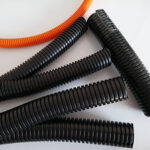
Celebrated for its superior mechanical properties, PA6 is a top choice in injection molding for producing automotive parts and electronic components. Its stiffness, toughness, and wear resistance make it ideal for high-performance parts, while its good insulation and chemical resistance enhance product durability and safety.
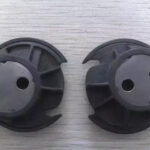
With its high crystallinity and heat resistance, PA66 excels in manufacturing machinery parts and automotive components through injection molding. It's particularly suited for creating gears, rollers, pulleys, and electrical insulation layers, offering stiffness and strength that withstand demanding applications.
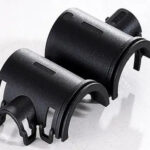
This semi-translucent material boasts low moisture absorption and maintains flexibility over a wide temperature range, making it perfect for automotive fuel lines and brake system hoses. Its properties benefit injection molded products requiring low-temperature performance and durability.
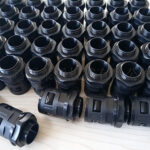
Similar to PA11 but optimized for even lower density and water absorption, PA12 is utilized in injection molding for automotive and electronic applications where high decomposition temperature and excellent low-temperature resistance are critical.
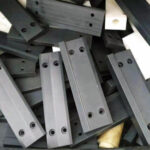
PA46's high crystallinity and temperature resistance make it suitable for injection molding parts that operate under high temperatures, such as automotive engine components and electrical industry parts like contactors and sockets, requiring high heat resistance and fatigue strength.
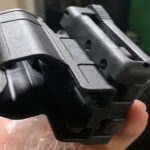
Positioned between PA6 and PA66 in terms of strength, PA610's low density and good dimensional stability make it ideal for injection molding precision plastic parts. Its resistance to water and humidity impacts minimally on the molding process, ensuring consistency and quality in products like fuel lines and electrical insulation materials.
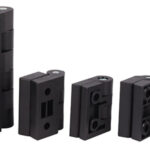
Distinguished by its toughness and low water absorption, PA612 is preferred for injection molding high-end toothbrush bristles and cable sheathing, where wear resistance, minimal molding shrinkage, and dimensional stability are paramount.
In the realm of automotive engineering, our injection molded Nylon parts play a pivotal role in elevating vehicle functionality. They offer a unique combination of strength, thermal stability, and chemical resistance, contributing to the vehicle’s performance and longevity.

Nylon’s inherent properties make it a material of choice for electronic and electrical equipment, where safety, precision, and longevity are paramount.

Consumer products benefit from Nylon’s versatile application range, offering manufacturers the ability to create goods that are not only durable and practical but also visually appealing.

The mechanical sector demands components that can sustain performance and outlast challenging conditions.





Introduction Quality assurance in n
Introduction Overview of Nylon Mate
Introduction Injection molding, a m
Introduction In the rapidly advanci
What is Liquid Silicone Rubber (LSR
Introduction Liquid Silicone Rubber
Introduction What is Liquid Silicon
Overview of Liquid Silicone Rubber
Introduction What isLiquid Silicone
Introduction Silicone products have
Requirement Gathering
Gathering detailed information from the customer about their specific product requirements, including design specifications, dimensions, functionality, and any special features or considerations
Design and Engineering
We will work closely with the customer to develop a mold design that meets their requirements. This includes creating 3D CAD models, performing feasibility studies, and considering factors like mold complexity, parting lines, gating, and ejection methods.
Prototype Development
We will create prototypes of the mold or the actual product using rapid prototyping techniques, such as 3D printing . Prototypes allow the customer to evaluate the design, make any necessary adjustments, and ensure it meets their expectations before proceeding with mass production.
Mold Fabrication
Once the design is finalized, we will proceed with the fabrication of the custom mold. This involves using precision machining techniques, such as CNC milling or EDM (Electrical Discharge Machining), to create the mold cavity and other necessary features.
Mold Testing and Validation
We will perform tests on the mold to ensure it functions correctly and produces high-quality parts. This may involve conducting trial runs, adjusting process parameters, and fine-tuning the mold design if needed.
Mass Production
Once the mold is validated, We will initiate mass production of the liquid silicone products using the custom mold. The production process will follow the established parameters and quality control procedures to ensure consistency and meet the customer’s specifications.
Check out the growing reviews from our contented clients who have experienced the MoldTechPro Service Before.




Got a project in mind or a question to ask?
Don’t wait! Our team is ready to help.
Contact us and let’s transform your ideas into reality today!
We’re committed to responding within 12 hours.
We will contact you within 12 hours, please pay attention to the email with the suffix “@moldtechpro.com”.